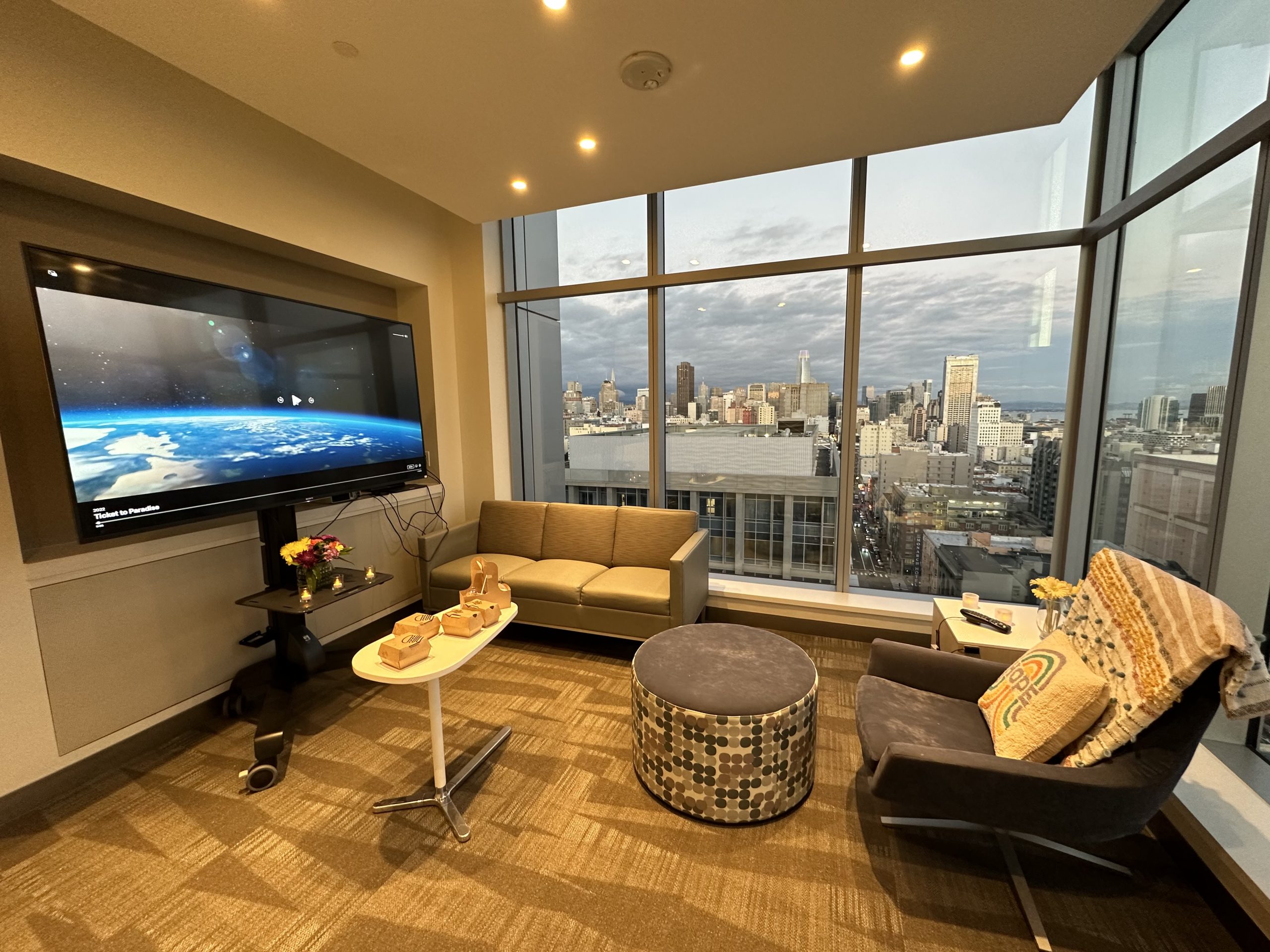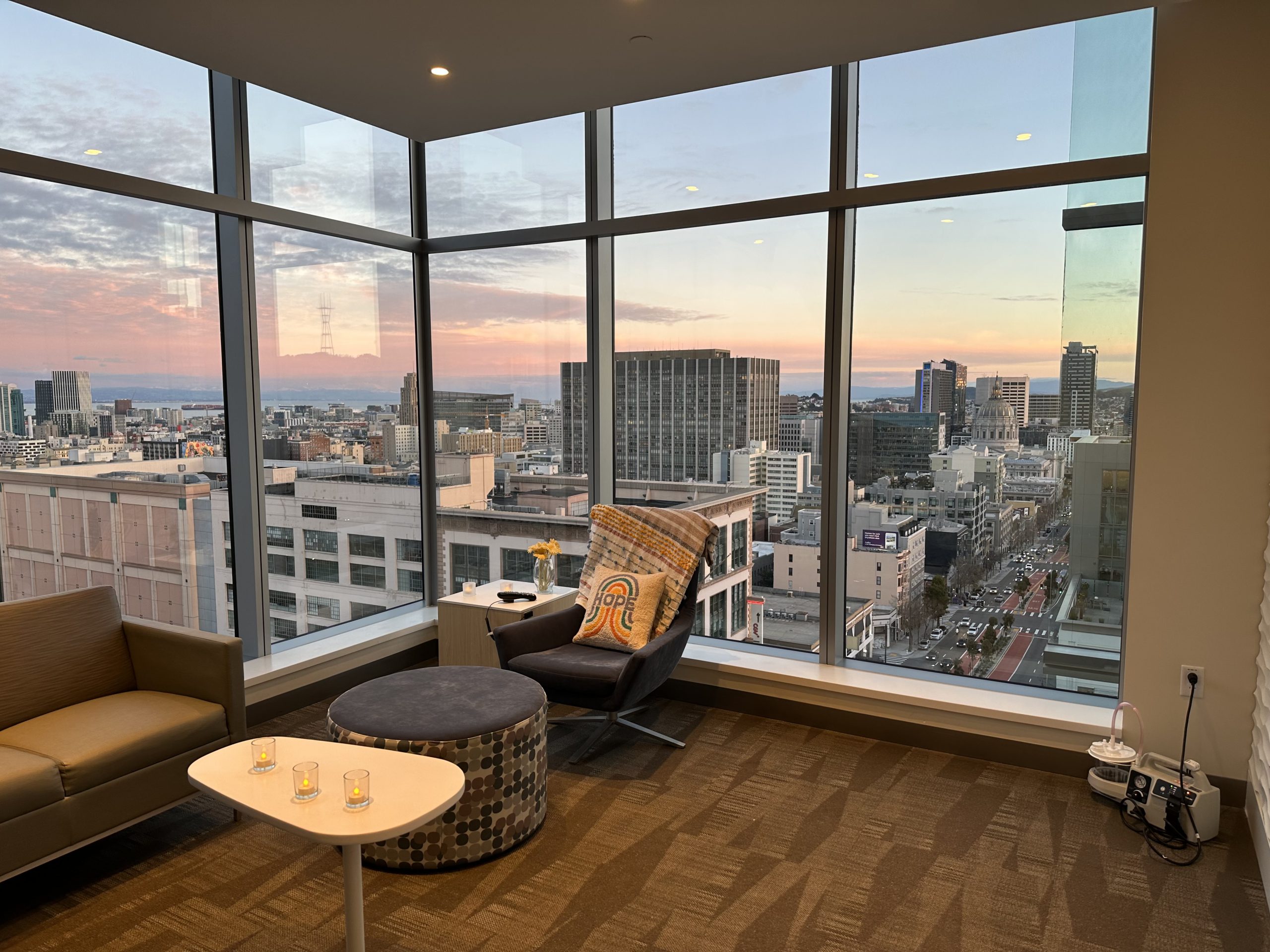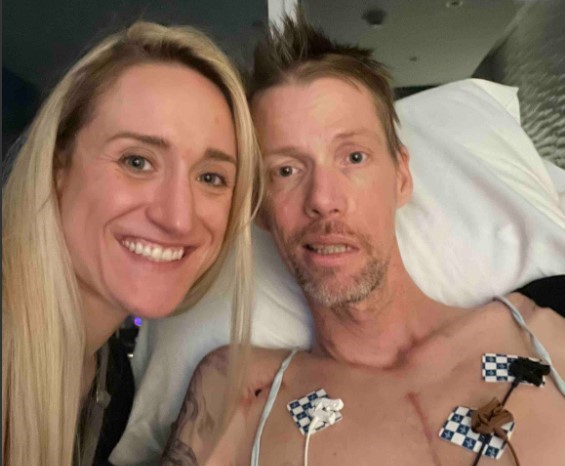It’s almost as if you can feel the warmth emitted from the flameless candles.
The gentle glow of these battery-powered devices is just one of the many touches the team at California Pacific Medical Center’s Kanbar Cardiac Center used to create a special evening for a special couple.
A recent date night is just what the doctor ordered for husband-and-wife Brad and Chantel Whitelaw.
The pair have endured Brad’s health battle for many months.

A patient family room at Sutter Health’s CPMC in San Francisco is set up for Brad and Chantel’s date night.
That’s why Dr. Michael Pham, chief of cardiology and medical director of advanced heart failure, mechanical circulatory support, and heart transplantation at the Sutter Health hospital in San Francisco, prescribed an evening of connection and normalcy for the couple.
“We wanted to make possible a good ol’ fashioned movie night that would feel like home,” said Dr. Pham.
LED candles, good tunes and flowers helped set the mood.
“It was magical,” said Chantel. “After four months, a night like this makes the repetitive days doable.”
Beyond the medicine of long hospitalizations
It’s no surprise that feeling emotionally bad can make us feel physically bad. It’s a cycle that perpetuates itself.
Research shows that long-term hospitalizations can impact patients’ emotional reactions and psychological well-being. This can negatively affect their physical health and healing, too.
Experienced healthcare providers like those across Sutter Health’s not-for-profit system of care understand this cycle. They know that when the weeks start to pile up like dishes in the sink it can be draining for everyone involved. The patient, their partner, kids, parents and other caregivers are all along for what may be a bumpy ride with an everchanging destination.
Moments of relief and distraction make a difference.
“We look for opportunities to help support patients and families throughout their hospital stay,” said Dr. Pham. “Not everything that heals is medicine. It can also be some sort of respite beyond treatment.”
Many Sutter Health hospitals like CPMC offer music therapy, pet or art therapy programs, as well as support groups to help patients and families cope during illness.
Brad’s journey, from A-fib to transplant
Brad, age 40, has been at patient at CPMC since November 2022.
He suffered from an irregular heart rhythm known as atrial fibrillation, or A-fib, earlier in life and was treated with an ablation. Last summer, Brad’s arrythmia returned.
His heart was so severely weakened that he required immediate transfer to CPMC, where he could receive the highest level of cardiac care.
Brad was flown to the medical center’s Van Ness campus, where surgeons placed a miniature heart pump, called an Impella, directly into his heart to keep him alive until he could receive a life-saving heart transplant.
In the past, placement of heart pumps required open-heart surgery, but advances in technology have now allowed surgeons to place miniature devices through a small incision under the patient’s collarbone. Using X-ray images, the devices are advanced directly into the heart and secured in place, allowing patients to walk and participate in physical therapy.
During his hospitalization, Brad developed a rare condition in which his body reacted abnormally to Heparin, a blood thinner commonly used to prevent blood clots, and he had to wait on the Impella heart pump before being eligible for a heart transplant. He ultimately went on to receive his heart transplant and is continuing to recover.
Chantel has been by his side through it all.
As Dr. Pham explains, Brad’s case and chain of events is pretty rare.
According to Dr. Pham, long health battles can place significant stress on relationships, particularly when one partner is in the hospital for an extended time.
“Brad and Chantel are an incredible couple. They’ve managed to stay positive and focused on Brad’s recovery, despite a very long hospitalization with many ups and downs. They do this in addition to being courageous parents for their two young kids,” said Dr. Pham.
Chantel’s enduring love helps Brad endure his hospital stay
Brad and Chantel have two young kids, Tayler and Tanner.
Their family home in Incline Village is some four hours away from San Francisco on the north shore of Lake Tahoe.

A stellar sunset creates the perfect backdrop for Chantel and Brad’s “date night” at CPMC in San Francisco. Brad is at the Sutter Health medical center following his heart transplant.
The couple rely on the children’s grandparents, family, friends and community for support and childcare. A close friend even set up a GoFundMe page to help with the family’s expenses.
Chantel’s employer, Hyatt, also provided Chantel and her mom with extended-stay hotel rooms for the family to be close to Brad, cheerleading him every day.
Their date night was a much-needed change of pace … and place.
You’d hardly know the pair had left the confines of the hospital’s 10th floor cardiac wing.
Totally transformed was one of the corner family rooms into a romantic lounge.
CPMC’s Kanbar Center and media services staff brought up Brad’s cardiac chair from the intensive care unit, wheeled in a giant TV, and rented the couple the romantic comedy, “Ticket to Paradise.”
CPMC’s team took care to set the mood, which included takeout from Shake Shack and cozy throws and pillows. Even Mother Nature played her part with a dreamy sunset complete with hazy streaks of pink and purples that stretched across the sky.
Chantel says one of the highlights was finally trying Shake Shack’s ice cream custard. “It’s just amazing as we’ve heard,” she confirmed.
Today, Brad is continuing to gain his strength before moving to an in-patient rehabilitation program.
“I’m very much trying to reframe our thinking now from ‘when can Brad go to rehab’ and changing that to “how can we get Brad healthy” … trying to throw timelines off the table. We are going to make every day as great as we can,” Chantel said.
“This date night certainly helped with that. We are so blessed to be taken care by such amazing people.”





